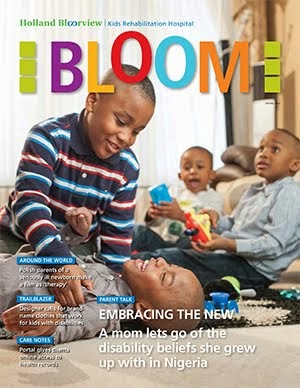In the last couple of days three stories on social media jumped out because they portray such different, opposing, pictures of what disability means in our culture.
Last night CTV reported that Swiss genetic lab Genoma used a family photo of a child with Down syndrome belonging to a Canadian family in a building-size banner to promote their prenatal test for diagnosing Down syndrome in a fetus.
The photo was used without consent or knowledge of the Canadian family.
Genoma says it acquired the image legally through a stock photo company and is taking legal action against them.
It's both horrifying and not surprising.
Horrifying that a parent would find a beloved photo of their child in an ad suggesting that a child like her should be aborted. And not surprising in that a company is trying to illustrate in its ad the reason for, or 'benefit,' of their test.
What is surprising is that a company wouldn't think twice about purchasing a stock image of a living, breathing child and using it to promote public questioning of the worth of children like her.
It reminded me of when a Duke University researcher contacted me last year to let me know that my son's rare genetic deletion was now on the list of disorders identified by microarray analysis of a fetus’s DNA. I wrote about how that felt, a bit of a knock-out punch, here.
Earlier this week The New Family posted this story about two Canadian moms who set out to adopt with one request: they wanted a child with Down syndrome. This is how one of the moms, Holly Graham, explains it:
"Rewind 25 years to when I was a little girl. I had a best friend named Mandy who just happened to have Down syndrome. She was fun, loving, friendly and magical. I always knew Mandy was different, I didn’t know why, and it didn’t matter. I just knew that I loved every single thing about Mandy. One day I came home from school and proclaimed to my mom that I was going to have a baby just like Mandy one day!"
And now Holly and her partner Alex are the proud parents of Jaxson, age 1, who has Down syndrome.
On the one hand, you have an entire industry devoted to preventing the birth of a child with Down syndrome. And on the other, you have a couple who choose to parent a child with Down syndrome.
And finally, there was this piece published a couple of days ago, which I read this morning, about British anthropologists who suggest disability itself is what made us human from an evolutionary standpoint, promoting our social, empathetic, flexible natures. This line of thinking fits with the views of French geophysicist Xavier Pichon, who helped create the field of plate tectonics.
As Xavier told BLOOM in an interview: "What I discovered is that the major difference between human societies and other societies of living beings is that humans have a capacity for empathy, which leads them to take care [over the long term] of those who have been affected by major suffering and handicaps. I was very impressed by studies of skeletons of 100,000-year-old humans which demonstrated that these people took care of heavily handicapped people [for decades]. This is most remarkable as these people were nomad, hunter-gatherers who lived in groups of 20 to 25 people at most."
So where does the truth lie?
Earlier this week my team met with Dr. Peter Rosenbaum, a former chief of medical staff here who heads up the CanChild Centre for Childhood Disability Research at McMaster University. Yesterday Peter, a developmental pediatrician and children's rehab researcher, was awarded Holland Bloorview's Medal of Excellence in Childhood Disability.
He noted that medicine has swung too far to a biomedical, science side focused on "cure," forgetting that the most important quality in a health professional is human "care."

























0 comments:
Post a Comment